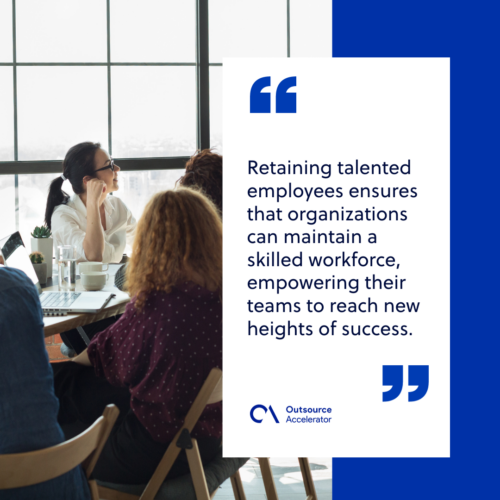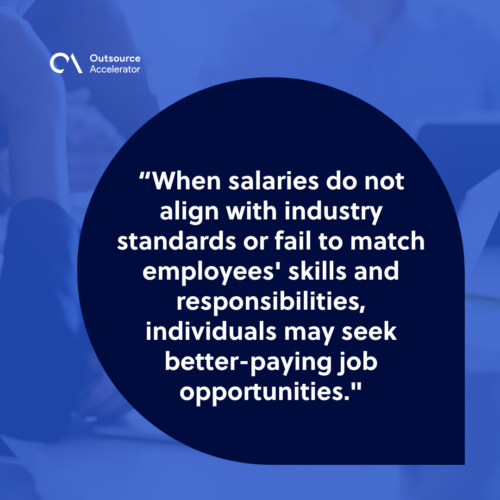Employee retention problems and how to solve them

Employees are crucial to the success and growth of any organization. They get the job done by making operations work how they need to and taking care of their customers on the company’s part.
However, organizations naturally face employee retention problems that impact how long a staff stays with them. The effects of the great resignation and increasing skill gap even worsened the situation for retention.
Based on a 2021 Pew Research, low pay, lack of career advancement, and feeling disrespected at work are three top reasons employees leave a company.
Losing talented staff can result in increased recruitment costs, decreased productivity, and negatively impact company culture.
Read more about the five common employee retention problems organizations face and their practical solutions.
Why is employee retention important?
Employees are the backbone of any organization. Retaining talented employees ensures that organizations can maintain a skilled workforce, empowering their teams to reach new heights of success.
Experienced employees bring valuable knowledge and expertise to the table, leading to improved productivity and higher-quality output.
Furthermore, a stable and dedicated workforce contributes to a positive company culture. This fosters collaboration, loyalty, and employee engagement. Studies by Gallup show that engaged and happy employees can boost productivity by at least 21%.

5 employee retention problems and strategies to overcome them
The first step to improving employee retention is to find out its causes. Here are five employee retention problems in the workplace today:
1. Micromanagement
Micromanagement is a prevalent problem that can suffocate employee morale and hinder their professional growth.
When managers excessively control and monitor employees’ every move, trust erodes, and creativity suffocates.
Solution
Instead of hovering over employees’ shoulders, empower them by setting clear expectations and guidelines.
Trust your team members to complete their tasks and encourage autonomy. Offer constructive feedback and support when needed, but resist the urge to micromanage.
Building a culture of trust helps inspire greater confidence and motivation in your employees.
2. Better opportunities elsewhere
It is disheartening to see talented employees leave for better opportunities elsewhere.
This could be due to limited career advancement prospects, a lack of professional development opportunities, or a dearth of challenging work within the organization.
Solution
Regularly assess and communicate the career growth opportunities available within the organization.
Encourage employees to take on new responsibilities and provide them with robust training and mentorship programs to support their professional development.
3. Lack of recognition
One of the most common reasons employees leave organizations is feeling undervalued and underappreciated. Lack of recognition dampens morale and job satisfaction.
Solution
Implement a comprehensive recognition program that publicly acknowledges employees’ efforts and achievements.
Encourage constructive feedback and ensure that recognition is fair and consistent across the organization.
Celebrate successes as a team and create a positive work environment where employees feel valued and appreciated for their contributions.
4. Salary dissatisfaction
Inadequate compensation is a significant factor leading to employee turnover. When salaries do not align with industry standards or fail to match employees’ skills and responsibilities, individuals may seek better-paying job opportunities.
Solution
Adjust your salary structures according to your industry and economic changes to remain competitive in the market. Conduct salary benchmarking to ensure employees are compensated fairly for their skills and contributions.
By providing competitive compensation, you will demonstrate that you value and appreciate your employees’ hard work and dedication.

5. Lack of professional development
Employees have a deep desire to grow and develop their skills over time. If an organization does not provide sufficient opportunities for professional growth, individuals may feel stagnant and seek career advancement elsewhere.
Solution
Offer comprehensive training and development programs that align with employees’ career aspirations.
Create a culture that values continuous growth and supports employees’ professional development goals. Investing in their growth and development will motivate employees to stay and contribute their best.
3 prevention tips for employee retention problems
Gartner revealed that employee turnover is expected to increase by up to 24% in the next years. With this, organizations race to improve retention rates by prioritizing employees and changing their company culture.
Here are three of the common ways to prevent employee retention problems:
1. Hire suitable staff
Preventing employee retention problems starts with hiring the right people.
Take the time to identify the skills and traits that align with the organization’s culture, values, and goals. Conduct thorough interviews and assessments with your applicants to ensure a good fit.
Another good practice in getting staff for higher positions is through internal hiring strategies.
2. Keep up with market rates in salaries
To attract and retain top talent, it is crucial to offer competitive salaries.
Regularly monitor and adjust salary scales to keep pace with industry standards. Consider conducting salary surveys to ensure your compensation packages attract potential candidates.
At the same time, you can refer to job posting sites such as Indeed and Talent.com to see the average salaries of your staff.
Be transparent about compensation to show employees they are valued and their contributions are recognized.
3. Hire offshore staffing
Offshore staffing can be an effective way to retain employees and minimize turnover. Organizations can overcome geographical limitations by leveraging global talent and accessing a diverse pool of skilled professionals.
Engaging offshore staff can bring unique perspectives and valuable expertise to the organization, fostering growth and innovation.
You may also consider integrated resourcing with trusted industry experts like ConnectOS.








 Independent
Independent




